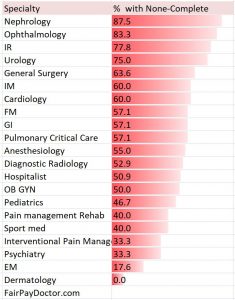Physician Non-Compete
At FairPayDoctor.com, we promote physician job market transparency and empower doctors through knowledge and financial education. Please join FairPayDoctor.com and share this post with your colleagues.
What is a Non-Compete Agreement?
Has your employer offered you a contract that includes a non-compete agreement? Or do you even know if there is one in your current contract? Understanding this is vital for planning next steps in future employment.

Non-compete agreements vary by employer and job. Some states, like North Dakota, Oklahoma, and California, prohibit the enforcement of them. FairPayDoctor.com statistics show that over 50% of physicians have signed a contract including one. When they do apply, it generally states that once you no longer work for your current employer, you cannot start a competing business or work for a competitor within a specified time period and geographical region. While this is completely understandable from the employer’s perspective, unfair restrictions can cause rifts in an employee’s ability to make a living.
Three main factors of these agreements consist of time, area, and definition of competition. An employer who suggests a year or two for a non-compete is more reasonable than, say, five or more years. The determined area greatly depends on the industry and type of position. It could be measured by distance, city, or county. According to data we collected on FairPayDoctor.com, the average physician’s non-compete agreement is 13.4 months within a radius of 21.3 miles. The most important factor is the company’s definition of competition. The agreement could enforce not starting an identical competing company or prohibit employment with those on a specific list of direct competitors. If you are in a very specialized field, tight restrictions could be dangerous for your career. By making it difficult to change employment with a non-compete agreement, employers control your ability to change jobs.
Think about how far you’d have to travel if you were to switch employment. For instance, if the perimeter of competitors is rather wide, a physician would probably have to move in order to find a new job in their field. This can lead to loss of productive time and get expensive with moving costs, selling, and buying a new home. It is important to thoroughly understand your limitations if you were to leave the current position.Consider what effects a non-compete would have on you and your family before signing.
Consider if it’s necessary to the employer’s business or just a matter of control. If you’re a higher-level employee and would learn valuable strategy information from this company, would you cause damage by using it to start your own competing company?
Specialties like Radiology (53%) Hospitalists (51%) and EM (18%) don’t attract business of have no knowledge of trade secrets. Non-compete agreements for these and many other specialties only serves to control doctors’ ability to change employment and provide patient care. Check out full database for more details and pay info.

What Can we Do About It?
Read the entire contract and understand the limitations of the non-compete agreement. A labor attorney can help review your contract, point out its pitfalls and help with negotiation.By signing non-compete agreements,we are giving up the flexibility to work for whomever we choose.
While this can be fair within reasonable agreements, you are entitled to receiving something in exchange; although it is difficult to place a price on our freedom to practice medicine. Therefore, we urge you to do everything you can to not sign non-compete agreements. Courts typically consider the job itself the exchange. If you are currently job searching or unsatisfied with your current employment and facing this limitation as an obstacle, discuss the following possibilities with your employer:
• Ask the employer to take the non-compete clause out of the contract. Due to physician shortage, we have negotiating power. It is much easier to negotiate a non-compete out of your contract before you accept the position and employer needs you, vs. you are leaving.
• Due to the considerable expenses and inconvenience, it might be worthwhile buying out of the non-compete. Ask your employer how much it would cost to do so.
• Ask your new employer to cover the cost of the non-compete buy out.
• Have an attorney negotiate the non-compete out or get a favorable judgment on your behalf. It can be difficult to enforce such agreements specially in undeserved locations. A competent reduction can help you navigate these legal waters.
Again, if you have any concerns, speak to an experienced lawyer in your state. If the signed agreement is unreasonable, they could help you adjust it in court with your employer. More info can be found at nolo.com.
At FairPayDoctor, we value physicians being able to exercise their rights within the workplace. If you have any additional questions or experiences to share, comment below!
